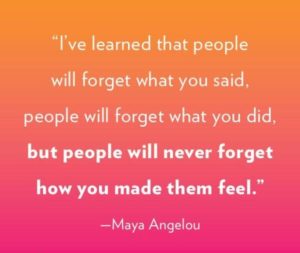What Are Emotional Types
According to Dr. Judith Orloff, most people fall into one of four emotional types that divide into two categories:
Emotionally Shut Down
Or
Emotionally Sensitive/Expressive
People who are emotionally shutdown are usually those who pride themselves on their intellect and rationality. They disdain emotion as weak and irrational. They may also be people who see themselves as a rock, unaffected by the emotions around them yet unable to express their emotions.
These emotional types have never felt emotionally safe. They retreat into two approved cultural archetypes: The Thinker and The Rock. Inside, they are frightened and lonely. Outside, they project themselves as masters of the universe.
Emotion ally sensitive people feel the emotions of those around them. Often, these people are confused about the ownership of emotions. Is this my feeling or is this someone else’s feeling? Emotionally expressive people wear their emotions on their sleeves. They have few filters or boundaries and talk about whatever they are feeling in the moment. They are generally poor listeners and are self-absorbed.
ally sensitive people feel the emotions of those around them. Often, these people are confused about the ownership of emotions. Is this my feeling or is this someone else’s feeling? Emotionally expressive people wear their emotions on their sleeves. They have few filters or boundaries and talk about whatever they are feeling in the moment. They are generally poor listeners and are self-absorbed.
Over the years, I have observed a common life experience in of all of these emotional types: They were emotionally invalidated as children.
Emotional invalidation occurs whenever an adult says something like, “Stop crying,” “Don’t be a sissy,” “Get tough,” “or “It’s not that bad.” Parents unwittingly use over 200 emotionally invalidating phrases on their children. Each phrase is a knife-wound into the children’s psyche.
Parents invalidate their children’s emotions for two reasons. First, emotional invalidation is what they know because their parents and grandparents invalidated them. The cycle of emotional invalidation has been passed down from generation to generation for millennia. Western culture, which finds emotions to be weak and evil, implicitly approves of emotional invalidation. Hence, emotional invalidation is insidious and pervasive.
Second, parents, being emotionally incompetent because of their emotional invalidation as children, experience anxiety over their children’s emotions. They unconsciously need to soothe their anxiety. Their brain’s, desiring to do anything to stop the anxiety, enter into a perverse logic that says, “Stop the child’s emotions, and you will feel better.”
The Intellect and The Rock were invalidated to such a degree that they retreated inside themselves. They hide behind the wall of rationality or a stiff upper lip, claiming that emotionality is weak. Sadly, they were weakened by their emotional incompetency.
The two other emotional types, the Emotionally Sensitive and the Emotional Gusher, likewise suffered invalidation. The Emotionally Sensitive person was probably born that way. I have witnessed hundreds of people who tell of the horrors of being a sensitive child in a family of Thinkers and Rocks. The Gusher probably adapted to emotional invalidation by getting rid of feelings as quickly as possible.
What Makes Some Emotional Types So Effective
Most emotional types suffer from some dysfunction. A few are incredibly effective. On any emotional intelligence scale, they score off the chart. Their lives are happy and successful. The major difference between emotional types that suffer and those that succeed is emotional competency.
What is Emotional Competency?
You’ve no doubt heard the term emotional intelligence but probably have not heard about emotional competency. Emotional intelligence is a measure of how you score on questions that test your emotional self-awareness, emotional control, emotional expression, your recognition of emotions in others, and your ability to empathize with those emotions. Emotional intelligence is not a skill; it is a measure of a set of skills. Those skills are collectively called emotional competency. When you are emotionally competent, you have high emotional intelligence. When you have low emotional competency, you have low emotional intelligence.
How Can You Learn Emotional Competency
Unless blessed with parents that were emotionally competent, developing emotional competency is not natural or intuitive for adults. However, you can learn emotional competency, no matter how deeply hurt in childhood. The basic skill is learning how to listen and reflect back the emotions of others. I wrote about my discovery of this basic skill in De-Escalate: How to Calm an Angry Person in 90 Seconds or Less.
As you learn to listen and reflect back emotions, you become aware of your own emotions. When you learn how to reflect your own emotions back to yourself, you gain control. You become emotionally competent.
Emotional types can heal when they learn to be emotionally competent. The Thinker becomes a Wise Sage. The Rock becomes a pillar of strength grounded in deep compassion. The Emotionally Sensitive becomes a deep healer, and the Gusher experiences emotions in a co-creative way.
If you would like to learn more about developing your emotional competency, check out the Resources in the menu bar.
Like to Join Our Tribe?
Let's have a joyous conversation that starts today.
- We don't spam.
- We don't sell your email.
- If you don't open our emails over a period of time, we'll gracefully unsubscribe you.

Comments are closed.